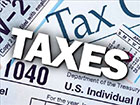The Best Way to Ease the Burden of Tax Season: Keep Good Records
 It’s tax season, which for many small business owners is a time of stress and anxiety and often reflection on what could have been done better. Almost always the answer is, “I could have kept better records”. As you sit fumbling through a year’s worth of receipts, or poring over online bank statements or cluttered spreadsheets it is easy to see that an effective record system would make tax season so much easier. And you aren’t alone. According to the Small Business Accounting Report, 33% of companies say that managing paperwork and record keeping is one of the biggest accounting challenges they face.
It’s tax season, which for many small business owners is a time of stress and anxiety and often reflection on what could have been done better. Almost always the answer is, “I could have kept better records”. As you sit fumbling through a year’s worth of receipts, or poring over online bank statements or cluttered spreadsheets it is easy to see that an effective record system would make tax season so much easier. And you aren’t alone. According to the Small Business Accounting Report, 33% of companies say that managing paperwork and record keeping is one of the biggest accounting challenges they face.
Taxes don’t need to be a cause for stress, and tax season doesn’t need to mean hours or even days spent reviewing the past year’s finances. In fact, with proper record keeping practices your taxes will be done before you even begin - all you will have to do is hand over your records or totals to your accountant. Small business owners are busy, and it can often be hard to find the time to keep records as you go; but in the end 5-10 minutes a day will save you hours of work at the end of the year and help you sleep better. It may seem intimidating to set up a system for effective record keeping, but it can be surprisingly easy.
Recording expenses and keeping track of receipts
The first step to keeping good records is setting up an effective system for keeping track of your expenses and your receipts for those expenses. There are many tax diaries available that make it easy for you to record your daily expenses - what you spent, where you spent it, why you spent it, and even what tax category it will eventually fall under. This is without a doubt the easiest way to keep good records. Each day, put aside 5-10 minutes to review your receipts and your wallet and make sure each business expense is recorded. If you have the receipt (and you should have the receipt) you can collect them in the tax organizer or in a folder system for each month (January, February, etc.). Then at the end of the year, once taxes are done, you can put all your receipts for the year in a 2014 folder.
As Sandy Botkin explained to CBS News, "A tax organizer has all the questions that the IRS requires you to answer about travel, entertainment, and other expenses. It will bulletproof your records and eliminate procrastination, and if you're audited, it shifts the burden of proof to the IRS."
Managing inventory and assets
Expenses aren’t the only records you need to keep for your business tax returns. Assets and inventory can have a significant impact on your company's tax liability; however, according to the Small Business Accounting Report, only 17% of companies use an asset management system that allows for auditing. This may in part be explained by the fact that 74% of business owners don’t actually understand how ghost assets can impact their books and their taxes.
A ghost asset is inventory or an asset that “cannot be accounted for because it is physically missing or rendered unusable.” But avoiding ghost assets is easy with sophisticated inventory and asset management systems and software. Using an effective inventory management system, often including an asset management software system, companies can easily prepare their inventory for end of year taxes and any potential audits.
Don’t forget to keep your records after tax season
Creating a good record keeping and asset management system isn’t only important for tax season, it also protects you against potential future audits. However, to do so you need to keep the records around for a few years. Most tax records just need to be kept for 3 years - this includes your tax diary, receipts (especially for expensive items), and any asset audits or inventories. In some cases you may need to keep your records longer, but in almost all cases 6 years is the longest. If you aren’t sure what records to keep or how long to keep them, the IRS has a sound guide to assist you.
The bottom line for any business owner is good records make good friends and more importantly they will allow you to spend time with your actual friends during tax season instead of working on your taxes.

Brian Sutter, Director of Marketing at Wasp Barcode Technologies (www.waspbarcode.com). Wasp Barcode Technologies’ focus and expertise is in small business. For over 13 years, Wasp has developed a loyal base of 250,000 customers in manufacturing, warehousing & distribution, retail, government, education as well as healthcare services.

 Delicious
Delicious Digg
Digg StumbleUpon
StumbleUpon Propeller
Propeller Reddit
Reddit Magnoliacom
Magnoliacom Newsvine
Newsvine
Comments
Post new comment